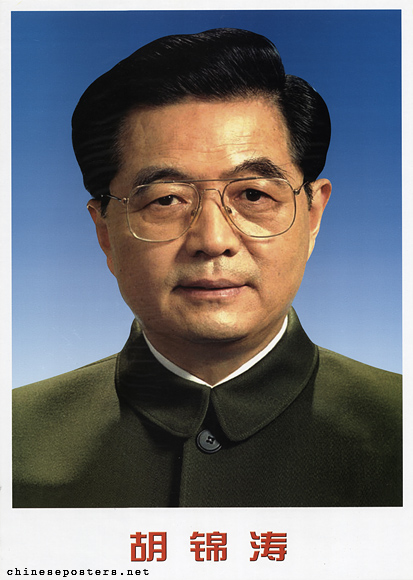More languages
More actions
Jucheguevara (talk | contribs) No edit summary Tag: Visual edit |
No edit summary |
||
| Line 1: | Line 1: | ||
'''Hu Jintao''' is a Chinese retired politician who was the [[Communist Party of China]]'s General Secretary ( | '''Hu Jintao''' (born 21 December 1942) is a Chinese retired politician who was the [[Communist Party of China]]'s General Secretary (2002—2012) and the President of [[People's Republic of China|China]] (2003—2013) among other positions, many of which were succeeded by now-President [[Xi Jinping]]. | ||
[[File:HuJintao.jpg|right|thumb|Comrade Hu Jintao]] | |||
During his term in office, Hu reintroduced state control in some sectors of the economy that were relaxed by the previous administration. Hu sought to improve socio-economic equality domestically through the [[Scientific Outlook on Development]], which aimed to build a "[[Harmonious Socialist Society]]" that was prosperous and free of social conflict. | During his term in office, Hu reintroduced state control in some sectors of the economy that were relaxed by the previous administration. Hu sought to improve socio-economic equality domestically through the [[Scientific Outlook on Development]], which aimed to build a "[[Harmonious Socialist Society]]" that was prosperous and free of social conflict. | ||
Revision as of 06:19, 6 February 2023
Hu Jintao (born 21 December 1942) is a Chinese retired politician who was the Communist Party of China's General Secretary (2002—2012) and the President of China (2003—2013) among other positions, many of which were succeeded by now-President Xi Jinping.

During his term in office, Hu reintroduced state control in some sectors of the economy that were relaxed by the previous administration. Hu sought to improve socio-economic equality domestically through the Scientific Outlook on Development, which aimed to build a "Harmonious Socialist Society" that was prosperous and free of social conflict.
In foreign policy, Hu advocated for "China's peaceful development", pursuing soft power in international relations and a corporate approach to diplomacy.
